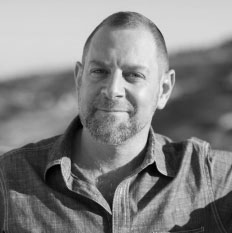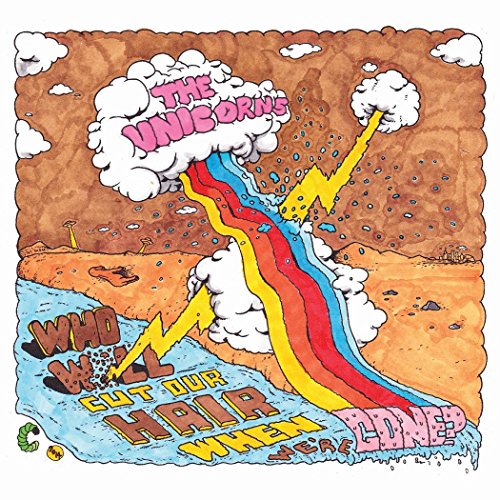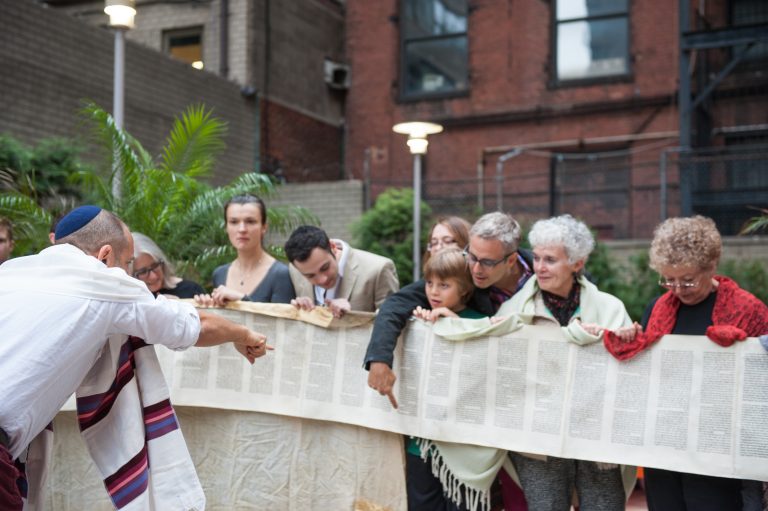Amichai Lau-Lavie
Deep Laughter in the Place of the Deepest Pain
“Humor is always about ‘as if.’ And it just relaxes everybody. We’re going to laugh.”
Transparent creator Jill Soloway describes Amichai Lau-Lavie as “a God-optional, patriarchy-toppling, Jewish modern mind.” He uses humor to connect — to himself and others, his family, his sexual identity, and his spiritual life. The rabbi says the Jewish people have endured because of their ability to laugh at themselves and, in this way, laugh at the world.
Guest

Amichai Lau-Lavie is a rabbi and founding spiritual leader of Lab/Shul in New York City. He’s also the founding director of Storahtelling.
Transcript
[music: “Ixtepec” by Café Tacvba]
RABBI AMICHAI LAU-LAVIE: Humor is an essential spice in the soup, because it simply opens up the possibilities — that it isn’t just one thing. There isn’t one truth. It’s not “as is.” Humor is always about “as if.”
LILY PERCY, HOST: I’m Lily Percy, and this is Creating Our Own Lives, COOL for short, the podcast where I ask people to think through how they shape their lives. And hopefully by listening, we learn how to create our own.
This season on COOL, we’re talking about humor as a tool for survival. One of the things that I’m fascinated by is how we use humor to connect — to ourselves, to our families, to our sexual identities, to our spiritual lives. And this is how Amichai Lau-Lavie uses humor. Amichai’s a rabbi and an artist who lives in New York. He’s been described by Transparent creator Jill Soloway as “a God-optional, patriarchy-toppling, Jewish modern mind.” Amichai says the Jewish people have endured because of their ability to laugh at themselves and, in this way, laugh at the world.
MS. PERCY: So the first question I would ask you is, how has humor been a tool for survival for you? How would you start to talk about that?
MR. LAU-LAVIE: I think humor as a key to survival is something that I grew up on. My father was a Holocaust survivor, and I grew up in Israel in a situation of great privilege. But the way to deal with both the Holocaust trauma and the ongoing security challenges between the Israeli/Palestinian crisis was a lot of very dark humor. And dark humor, as a way to tackle the unspoken and to laugh at our own folly, was always there. And it can be, on its sinister side, cynical and sarcastic, and on its benign side, just gut-wrenching hilarious.
At some point in the late ’90s, when I was in my late 20s, I began channeling, or perhaps personifying, a drag character. Basically, I began performing as an aged Hungarian widow who was the wife of six illustrious rabbis and has become a sex advisor and a marital advisor to the ultra-orthodox elite. Very fancy, very over-the-top. Three vodka tonics were necessary for me to leave the building so she can enter and take over. And she’s hilarious. And she is not me, even though I represent her. And she gave me the permission to be publicly spiritual, to use humor as a way to conduct ritual, and to really blur the line between what is funny and what is serious. I no longer represent her on this earth. I became a rabbi after being the rabbi’s wife through her for all these years.
MS. PERCY: So two questions that come up with what you just said. The first is, what were those specific examples, growing up, that dark humor that you saw? Because I mean that changes the way your humor goes, moving forward, what you experienced as a child. So what were some of those specific examples? And then I wonder if you can give me an example of how this woman that you were able to inhabit, how she allowed you to express yourself in a way you couldn’t otherwise.
MR. LAU-LAVIE: I’ll tell you just one story that I’ve shared before. So like I said, my father was a Holocaust survivor, and he had a big, big story and dramatic and tragic and heroic. And some of it was discussed, and a lot of things were not. When I came out as gay in my late teens, that was something that was very hard for my very religious family to talk about. And it turned out — or it sort of transpired to me, at some point, that one of the reasons my father was not able to really talk to me about my sexual choice, other than religiosity, was that as a very young man, he was incarcerated in a concentration camp. And gods only know what he saw there, and the level of archetype and stereotype and harshness that he associated with my sexual choice of love.
And then Hadassah, who was my drag personification, showed up and became quite famous for a while and was on the cover of magazines. And he was interviewed once about her, and they asked him, “Well, what do you think about your dau-?” And he said, “She has great legs.”
[laughter]
So I thought, wow, that just saved me so much therapy.
And then there was another incident, it’s a longer story, where my father and I went to Yad Vashem, the Holocaust Museum in Jerusalem, for a walk and a talk. We were in conversation then about faith. And at some point, there was a poster on the wall of Jews who lived in Poland before World War II, and there was a poster of a woman whose name was Hadassah Gross, my drag name. Oh! And my father turned to me and giggled, and said, “Look!” And we both started laughing, in the middle of the Holocaust Museum, about this very private joke that only he and I understood. And that, for me, was such a redemptive moment, deep laughter in the place of the deepest pain.
MS. PERCY: That’s amazing. So, I mean all these questions, you’ve already answered. I thought about how does humor help you connect with your family, how about with other people, with your spiritual life, with your sexuality? I mean it seems like Hadassah embodied that for you.
MR. LAU-LAVIE: She did, and people keep asking me to bring her back. And I say, you know what? It just doesn’t feel like I need her anymore. It’s like the scaffolding that now I don’t need. It’s when you begin a speech or a sermon, and you start off with a joke so that everyone feels relaxed. So humor opens up our hearts. It doesn’t allow us to take ourselves too seriously. It meets us where we’re at.
But I know that when I speak and when I lead worship these days, humor is an essential spice in the soup, because it simply opens up the possibilities, that it isn’t just one thing; there isn’t one truth. There isn’t top-down. It’s not “as is.” Humor is always about “as if.” And it just relaxes everybody. We’re going to laugh. And the best sermons, the best speeches, the best op-eds will have some kind of a side-glance, which is where humor comes in.
MS. PERCY: One of my favorite writers is Groucho Marx. And one of the things I love about his humor is that he managed to turn other people’s words around for comedy. He would take language and just use it to disarm. And there’s — famously, there’s this whole history of Jewish comedians, Mel Brooks and Albert Brooks and Carl Reiner, and you can go on and on and on. What do you think it is about the Jewish culture and faith that allows for humor to be such a big part of it?
MR. LAU-LAVIE: I will say, first of all, displacement. For the last 2000 years, with the exception now of the last 70 years or 100 years of the Israeli experiment, Jews have been all over the place. Now, when you’re all over the place, there isn’t a real estate deed that you hold onto. So it’s much more ethereal: the intellectual pursuit, the storytelling, the dreamscape of your identity is fluid; and humor, jokes, of the type of perspective that helps you be a diaspora existence. And I think we’ve cultivated the looking-at-things-from-the-side.
A couple years ago, there was a gathering in New York City of children of survivors, Holocaust survivors, on the anniversary of the liberation of Auschwitz. And we all told stories of our parents, because now they’re mostly dead, and we’re the holders of memory. But then afterwards, we went out to dinner at a restaurant nearby. And I don’t know how many bottles of wine went down, and half the table was psychoanalysts, and the other half, or the rest of us, I was a rabbi, there was a sex therapist, there was an architect. It was hilarious, because we told all the stories we couldn’t tell on stage of where our parents were crazy and what they used to survive and what they handed over to us. And it was sexy and inappropriate and dark and funny.
And it was healing. It was deeply healing and unrepeatable. So I think there is something in the Jewish consciousness that has endured — and has often endured because of the ability to laugh at yourself, and this way, to laugh at the world. And if I’m thinking of the Bible, and I’m thinking of the Talmud, and I’m thinking of Jewish mystical traditions, there is humor there. There are little winks here and there that you’ve just got to say, wow. Let’s not take ourselves 100% seriously but find a little way to — to wink. It’s that wink.
MS. PERCY: Can you give examples of that?
MR. LAU-LAVIE: Okay, so there’s this one prayer, my favorite Jewish prayer, which I affectionately call the “poo prayer.” So the poo prayer is what you say after you go to the bathroom and poo. Technically, you say it once a day in the morning, after your first — the primal poo of the day. But one can say it often. And it’s beautiful. It’s poetic. And it’s Talmudic; it’s pretty old. And there’s a line there that says, “Blessed are you, creator of the holes and the holy and the hollows and who I am, and thank — it is known before your throne of glory that just as I cannot stand before you one moment when I’ve really got to go,” da-da-da.
Anyway, I remember I was in my 20s, I’d already been disassociated with the religion I grew up with for quite a few years, and I felt I was finding my way. And I did what I did and got out, and the words kind of came to my mouth. I knew this by heart since childhood. And I — just thinking, wait a minute. So 1500 years ago, somebody wrote this prayer. And it was —were they imagining God sitting on the toilet? Because that’s hilarious. [laughs]
I can’t prove it, but I love — first of all, I love that in my tradition there is a prayer for poo. Right? Hello. Talk about the body being holy, every single hole and hollow. And secondly, if there is just a smidgen of a possibility that in that prayer is the “wink, wink” when the image of the Divine and therefore everybody poos — wow. Awesome.
MS. PERCY: You have to recite it, because first of all, I want to learn it, because I am so grateful every time I go poo that I need to know this so that I can pray.
MR. LAU-LAVIE: Well, I need to give you the English version, which I don’t remember offhand.
MS. PERCY: Okay.
MR. LAU-LAVIE: But…
MS. PERCY: Oh no, you don’t have to do the English version. You could — well, how would you recite it?
MR. LAU-LAVIE: The Hebrew?
MS. PERCY: Yeah, yeah. You don’t need to translate it.
MR. LAU-LAVIE: Whoa, okay. I have it an English translation somewhere, just not on me. [speaking Hebrew]. Loosely translated on the spot, spontaneously, as: “A blessing in the presence of the infinite. I honor the creator who has created me with wisdom and has installed within me holy, holy, hollow, hollow, holes, holes. It is known before your throne of glory that if one of them is closed or if one of them is open for just an instant, I am unable to be present. May I be present? And I honor you, creator and healer of all flesh.”
MS. PERCY: That’s amazing.
MR. LAU-LAVIE: Something like that.
MS. PERCY: Here’s to that.
MR. LAU-LAVIE: Amen.
[music: “I Was Born (A Unicorn)” by The Unicorns]
MS. PERCY: Rabbi Amichai Lau-Lavie is a writer, performance artist, and the founding spiritual leader of Lab/Shul. If you’re in New York City, go to one of their gatherings, especially if Amichai is leading it. You never know — one of these days, Hadassah may show up.
Creating Our Own Lives is produced by Maia Tarrell, Chris Heagle, and Trent Gilliss, and is an On Being Studios production. You can listen and subscribe on iTunes or wherever you download podcasts. And leave us a review on iTunes. It matters more than you think. I’m Lily Percy. Thanks for listening.
[music: “I Was Born (A Unicorn)” by The Unicorns]




